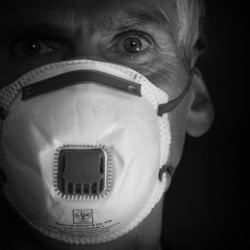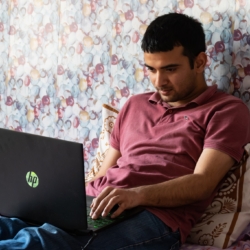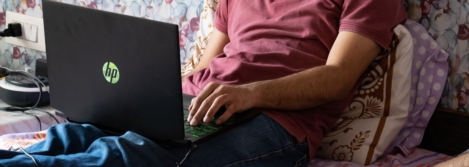September 16, 2020
Search Results for: working from home
September 8, 2020
Majority of businesses plan to move to smaller but more focused offices in future
by Neil Franklin • News, Property
 According to a new independent survey of over 500 senior business decision-makers, nearly three quarters believe COVID-19 will result in more UK businesses downsizing to smaller office spaces in the coming 12 months. Most also say they value the office and will be more focused on its strengths as part of the shift. The data from property developers Accumulate Capital claims to show how the COVID-19 pandemic has affected UK businesses and their commercial property needs. (more…)
According to a new independent survey of over 500 senior business decision-makers, nearly three quarters believe COVID-19 will result in more UK businesses downsizing to smaller office spaces in the coming 12 months. Most also say they value the office and will be more focused on its strengths as part of the shift. The data from property developers Accumulate Capital claims to show how the COVID-19 pandemic has affected UK businesses and their commercial property needs. (more…)
September 8, 2020
Is music at work a privilege for the powerful?
by Jayne Smith • Environment, News
 Seniority in the workplace could be directly correlated to how often you listen to music whilst you work, claims a poll of 1,000 UK office workers. The research, which was carried out by London office developer CO—RE, suggests that business owners and C-suite executives were the most likely to listen to music in their working environment. (more…)
Seniority in the workplace could be directly correlated to how often you listen to music whilst you work, claims a poll of 1,000 UK office workers. The research, which was carried out by London office developer CO—RE, suggests that business owners and C-suite executives were the most likely to listen to music in their working environment. (more…)
September 4, 2020
Workers feel unsafe returning to the workplace after COVID-19
by Jayne Smith • News, Wellbeing
 Insurance provider Protectivity has asked office workers around the UK how they’re feeling about going back to work as COVID-19 lockdown restrictions ease, what changes they have made during the lockdown period, their thoughts about attending workplace events over the next few months and how they’re feeling about their pets post-lockdown. (more…)
Insurance provider Protectivity has asked office workers around the UK how they’re feeling about going back to work as COVID-19 lockdown restrictions ease, what changes they have made during the lockdown period, their thoughts about attending workplace events over the next few months and how they’re feeling about their pets post-lockdown. (more…)
September 4, 2020
UK business leaders predict office downsizing in the coming year
by Jayne Smith • News, Property
 A new independent survey by Accumulate Capital suggests how the COVID-19 pandemic has affected UK businesses and their commercial property needs. The property development firm commissioned an independent survey of more than 500 senior decision-makers from businesses all over the UK and the majority believe there will be a need for downsizing to smaller office spaces in the future. (more…)
A new independent survey by Accumulate Capital suggests how the COVID-19 pandemic has affected UK businesses and their commercial property needs. The property development firm commissioned an independent survey of more than 500 senior decision-makers from businesses all over the UK and the majority believe there will be a need for downsizing to smaller office spaces in the future. (more…)
September 2, 2020
Are employees more productive since lockdown?
by Jayne Smith • Flexible working, News
 With many companies announcing that they will not force employees back to the office until next year, 34 percent of UK workers have admitted to feeling more productive since working from home. That’s according to new ‘Work Different’ research from Qualtrics.
With many companies announcing that they will not force employees back to the office until next year, 34 percent of UK workers have admitted to feeling more productive since working from home. That’s according to new ‘Work Different’ research from Qualtrics.
The research, which surveyed 2,000 UK workers, also claims that a third (31 percent) of workers have felt creative since working outside of the office, while over a quarter (27 percent) believe it’s been easier to collaborate with their colleagues since the coronavirus lockdown began. (more…)
August 20, 2020
Commuting, not Covid, main reason employees are avoiding offices
by Neil Franklin • News, Wellbeing
 Employees worried about returning to the office post-lockdown are most concerned about work-life balance and the daily commute, rather than their health, according to research from absence intelligence company e-days. Whereas only a quarter of employees are most worried about potential health implications, results of a snapshot poll of 100 workers show that 7 out of 10 of us are more concerned with impact to work-life balance (37 percent) or the office commute (34 percent). The research follows the change in government advice on 1 August 2020 meaning employers can make their own decisions about staff returning safely to work. (more…)
Employees worried about returning to the office post-lockdown are most concerned about work-life balance and the daily commute, rather than their health, according to research from absence intelligence company e-days. Whereas only a quarter of employees are most worried about potential health implications, results of a snapshot poll of 100 workers show that 7 out of 10 of us are more concerned with impact to work-life balance (37 percent) or the office commute (34 percent). The research follows the change in government advice on 1 August 2020 meaning employers can make their own decisions about staff returning safely to work. (more…)
August 20, 2020
Job clusters and urban sprawl will become evident post lockdown
by James Lennox • Cities, Features, Flexible working
 For most of us the experience of working from home this year has, on balance, been positive – enough that it may well become the norm after the COVID-19 crisis ends. But modelling by Victoria University’s Centre of Policy Studies shows there will be costs alongside the personal benefits, with more urban sprawl, job clusters with a flight to the biggest cities and greater economic disparities between regions. (more…)
For most of us the experience of working from home this year has, on balance, been positive – enough that it may well become the norm after the COVID-19 crisis ends. But modelling by Victoria University’s Centre of Policy Studies shows there will be costs alongside the personal benefits, with more urban sprawl, job clusters with a flight to the biggest cities and greater economic disparities between regions. (more…)
August 17, 2020
Furloughed workers feel insecure about their future
by Neil Franklin • Flexible working, News
 New data looking into the attitudes of 6,273 employees, commissioned by Perkbox, claims the considerable impacts of the furlough scheme and the prospect of returning to work to wellbeing. The research claims that 61 percent of furloughed workers have concerns over their future job security, and a further 42 percent have concerns about the future of their company due to their employer’s participation in the scheme. This is despite almost half (45 percent) enjoying the time off and break from working that this time provided. (more…)
New data looking into the attitudes of 6,273 employees, commissioned by Perkbox, claims the considerable impacts of the furlough scheme and the prospect of returning to work to wellbeing. The research claims that 61 percent of furloughed workers have concerns over their future job security, and a further 42 percent have concerns about the future of their company due to their employer’s participation in the scheme. This is despite almost half (45 percent) enjoying the time off and break from working that this time provided. (more…)
August 14, 2020
People increasingly confident about return to offices
by Neil Franklin • News, Wellbeing
 Half (49 percent) of employed British adults feel positive about the prospect of returning to their place of work after lockdown, with less than one in five (18 percent) feeling negative, an Aviva study claims. The findings paint a relatively positive picture for businesses that have supported their people through lockdown, such as regularly communicating with workers and taking necessary steps to manage the risk of infection in the workplace. However, where businesses have not embraced risk management and prevention strategies, employees may decide not to return to work at all. (more…)
Half (49 percent) of employed British adults feel positive about the prospect of returning to their place of work after lockdown, with less than one in five (18 percent) feeling negative, an Aviva study claims. The findings paint a relatively positive picture for businesses that have supported their people through lockdown, such as regularly communicating with workers and taking necessary steps to manage the risk of infection in the workplace. However, where businesses have not embraced risk management and prevention strategies, employees may decide not to return to work at all. (more…)
August 12, 2020
Casting a spell on the future of work and workplaces
by Mark Eltringham • Comment, Flexible working, Technology, Workplace design
 There was a time we used to talk with dismay about the Japanese phenomenon of intense social distancing known as hikikomori. We would consider with horror the isolation, lack of engagement with society, poor mental health and loneliness of the people who had almost completely withdrawn to their rooms. Those poor bastards locked up in enclosed spaces linked to the outside world only by screens. (more…)
There was a time we used to talk with dismay about the Japanese phenomenon of intense social distancing known as hikikomori. We would consider with horror the isolation, lack of engagement with society, poor mental health and loneliness of the people who had almost completely withdrawn to their rooms. Those poor bastards locked up in enclosed spaces linked to the outside world only by screens. (more…)






 A survey carried out by mental health organisation,
A survey carried out by mental health organisation, 

















August 28, 2020
A new social contract can improve the everyday experience of work
by Mark Spratt • Comment, Workplace